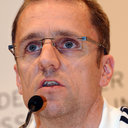Effects of graded carbohydrate supplementation on the immune response in cycling.
Kata kunci
Abstrak
OBJECTIVE
This study examined the acute immune response after three standardized cycling sessions of 4-h duration in the field with varying carbohydrate (CHO) supplementation in a randomized, double-blind, placebo-controlled fashion. We hypothesized that the ingestion of carbohydrate (6 or 12% CHO beverages; placebo (P) without CHO) during exercise attenuates the exercise-induced immune response in a dose-dependent manner.
METHODS
A total of 14 male competitive cyclists and triathletes (age: 25 +/- 5 yr; height: 180 +/- 7 cm; weight: 72 +/- 9 kg; VO2max: 67 +/- 6 mL.min(-1).kg(-1)) cycled for 4 h on a 400-m track at a given workload of 70% of the individual anaerobic threshold (198 +/- 21 W). Leukocyte and lymphocyte subpopulations were measured by flow cytometry before, immediately, and 1 and 19 h after exercise. In addition, C-reactive protein (CRP) interleukin 6 (IL-6), and cortisol were determined.
RESULTS
The exercise-induced increase in leukocytes, neutrophils, and monocytes was significantly attenuated to the same extent by 6 and 12% CHO (P < 0.001). No differences could be demonstrated for lymphocytes and natural killer cells. The increase in CRP was attenuated significantly by 12% CHO only (P < 0.05), whereas the increase in cortisol and IL-6 was significantly reduced by 6 and 12% CHO (P < 0.001). The postexercise neutrophilia, which dominated the exercise-induced leukocytosis, was strongly related to the postexercise concentration of cortisol (r = 0.72; P < 0.001).
CONCLUSIONS
Because of the lacking dose-dependent difference, the ingestion of at least 6% CHO beverages can sufficiently attenuate the exercise-induced immune response and stress, especially in phagocytizing cells (neutrophils and monocytes) by the reduced release of cortisol.


